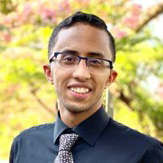An Egyptian Medical Student's Experience During the COVID-19 Pandemic

I am an Egyptian fifth-year medical student at Misr University for Science and Technology in Giza, Egypt, and after the COVID-19 outbreak in early 2020, I spent my quarantine with my father in Abu Dhabi. On March 16, 2020, Egyptian Prime Minister Mustafa Madboli issued precautionary measures about how Egypt would respond to the COVID-19 pandemic. One method was the restriction of airway crafts through national airports.1 Immediately upon my arrival at Cairo International Airport, my temperature was taken and I was screened for respiratory symptoms, which were confirmed with a phone call two weeks later. But as many public facilities closed down, all I had on mind was how I was going to complete my second semester of medical school.
One of the biggest challenges during the pandemic was ensuring a safe academic experience, especially because many students lived in other countries and they were considered a possible source of infection should they return to campus. In Egypt, every chancellor of a university had to implement online learning as a new platform for the curriculum, according to Dr. Khaled Abdel-Ghaffar's (Minister of Higher Education and Scientific Research in Egypt) meeting on March 15, 2020.2
Transforming the curriculum into an online format was no small feat. Medicine needs an in-depth review of each subject as well as the application of clinical skills with real-life patients as taught by every medical school around the world. As the lectures and sessions were switched to virtual, the question on all our minds was if we would accomplish the same intended learning objectives as when we attended the in-person learning.
Fortunately, all the departments of the faculty of medicine at the Misr University for Science and Technology worked hand-in-hand to bridge the gap between the online learning process and in-person lectures. For example, the Gynecology and Obstetrics Department provided a quick quiz as the last check-point for our understanding of the related gynecological topics. I believe that the virtual practical sessions taught by the Internal Medicine Department sufficiently fulfilled the interactive skills needed to reach a suitable diagnosis for each medical case. The clinical surgical skills in the form of animated and 3D videos were very useful and served as a great learning experience. Interpreting arterial blood gases and reading computerized tomography results are essential skills for every medical student, which were provided by the Pediatrics Department. Finally, in the Psychiatry Department, the PDF files were implemented in the required curriculum and the clinical case scenarios, which helped us enhance our clinical skills to attain the intended learning objectives.
Overall, my experience with online lessons was meaningful as it added flexibility, taught self-pacing and time management skills, and reduced financial costs. I also learned critical leadership skills by creating efficient processes, and making decisions about the best communication practices, such as what should be discussed in-person or electronically.
Hands-on experience wherever practiced, whether in the university hospital or in the lecture room, remains the cornerstone of medical knowledge every medical student should gain. However, the virtual world has become a reality of our daily lives. These newly learned skills will be essential as a future physician.
References:
- Akhbar El Yom Newspaper. From: https://akhbarelyom.com/news/newdetails/3016312/1. Cited on March 16, 2020. Updated on March 16, 2020.
- Masrawy Newspaper. From: https://www.masrawy.com/news/education-universityeducation/details/2020/3/14/1742952. Cited on March 14, 2020. Updated on March 14, 2020.

